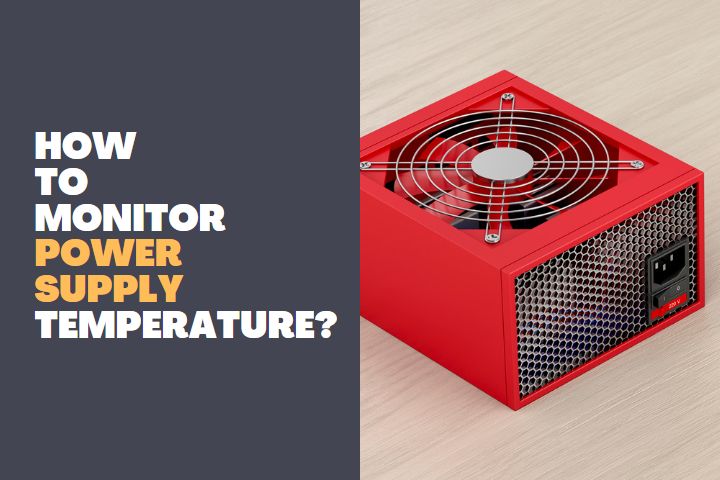The power supply is the most important part of a gaming PC. They go bad after a certain time and if they don’t meet the standards, they can ruin your entire system.
So How to pick a power supply for a gaming PC? It’s not as simple as looking at its wattage. You should consider factors such as efficiency, connectors, noise output, and modularity before selecting them.

In this article, we will discuss everything briefly about the power supply for your gaming desktop computer. Let’s Begin!
How to pick a power supply for a gaming PC?
The power supply is an integral part of any PC. Whether it is meant for gaming or productivity, a power supply is going to transfer the required amount of current to the respective components attached to the motherboard.
For gaming PC, the components used will be definitely high performing. Therefore, the PSU should be chosen according to those specifications.
The major factors affecting the choice of a PSU are Wattage, Compatibility with Motherboard, Type of Cable and Efficiency.
Wattage
First of all, while choosing a PSU for a gaming PC, you have to consider the wattage consumption of power-demanding components like CPU and GPU. If you have cooling fans, you should add their consumption too.
The power rating mentioned by the CPU and GPU manufacturers doesn’t even come close to the actual consumption. They are always way higher than the spec sheet and if you are overclocking, it will consume an enormous amount of power. Therefore, you should always buy a PSU that is 100 to 150W higher than the required power.
There are many online tools to calculate the wattage required for your PC. Especially if you are going to build one, you can easily choose the required components and the tool would give you the total wattage consumed by those components.
Compatibility with Motherboard
After obtaining the correct wattage, you must look at whether it is compatible with the motherboard.
The compatibility depends on the size of your PSU and Motherboard. There are mini ATX motherboards that cannot accommodate a larger PSU like ATX 12V.
PSUs have the standard form factors and are classified according to sizes such as ATX and SFX
Type of Cable
There are fixed types and modular type cables available.
Modular types usually come out of the box with higher-end PSUs. Whereas most PSUs come with fixed cables. In some mid-range PSU, you can find semi-modular cables too.
If you are ready to deal with a lot of cables you can opt for a fixed type. But if you are looking for hassle-free connectivity inside the PC case, then you can opt for modular or semi-modular cables
Efficiency
It is important to check for the efficiency rating of the PSU in order to reduce unwanted power consumption.
Because it will generate more heat and in turn, the fans tend to produce loud noises. Also, high-rated PSUs are built with quality components.
The efficiency rating is depended on how much power the PSU can supply and how much goes away as heat. For example, if a PSU can supply 80% power while 20% dissipates as heat, then the efficiency rating is 80.
Generally, PSUs with 80 plus ratings are recommended for all types of PCs. And especially for gaming, it is compulsory to get 80 plus rated PSU.
In the 80 plus category, there are different certifications available. They are:
- Diamond
- Titanium
- Platinum
- Gold
- Silver
- Bronze
- 80 Plus
Diamond certified is the highest rated PSU available and it costs too high. Gaming PCs can efficiently settle with Bronze or Silver certified PSUs.
The advantage of moving up through the PSU certification is that it produces very little heat. Therefore, the fans run less and thus producing less noise.
Read: How to discharge a computer power supply?
Do PSUs come with surge protection?
Generally, PSUs don’t come with surge protection. It is necessary to input surge protection in the electrical mains of your home or workplace. Or you have to plug your PC into the mains through a surge protector that is available commercially.
Surge protection is important because it will damage the components of the motherboard. PSUs come with very minimal protection from surges because they may lag on efficiency. Without surge protection, the PSU may get damaged and eventually all components of the motherboard.
Therefore, it is advisable to incorporate a surge protection device in the electrical mains of your home’s power grid. Or you can add a protection device that helps in cutting off supply to the PSU or gets short-circuited when excess voltage surges in.
Read: Can Power Supply cause Blue Screen?
Is multi-rail PSU better than single rail PSU?
PSUs contain +12V rails for power supply management. A single rail PSU has on +12V rail and a multi-rail PSU has two or more +12V rails.
A single rail supplies power to whatever component it is connected to. It doesn’t concern the connector or cable through which it is connected.
A multi-rail divides its power into the different rails but it doesn’t share the power between the rails. Because of this, you must be aware of each component connected to the exact number of rails. At the same time, it also has overcurrent protection which shuts down the unit when there is a power surge.
But in reality, both single and multi-rail systems give the same performance and don’t have any difference. So, you may opt for any system for your gaming PC and if you absolutely need higher protection, you may go for multi-rails.
Conclusion
Choosing a PSU for a gaming PC is very important to provide proper power to the core components. Also, it helps in boosting the performance of the CPU and GPU.
Therefore, pick a power supply according to the specifications mentioned and enjoy an ultimate gaming experience.







